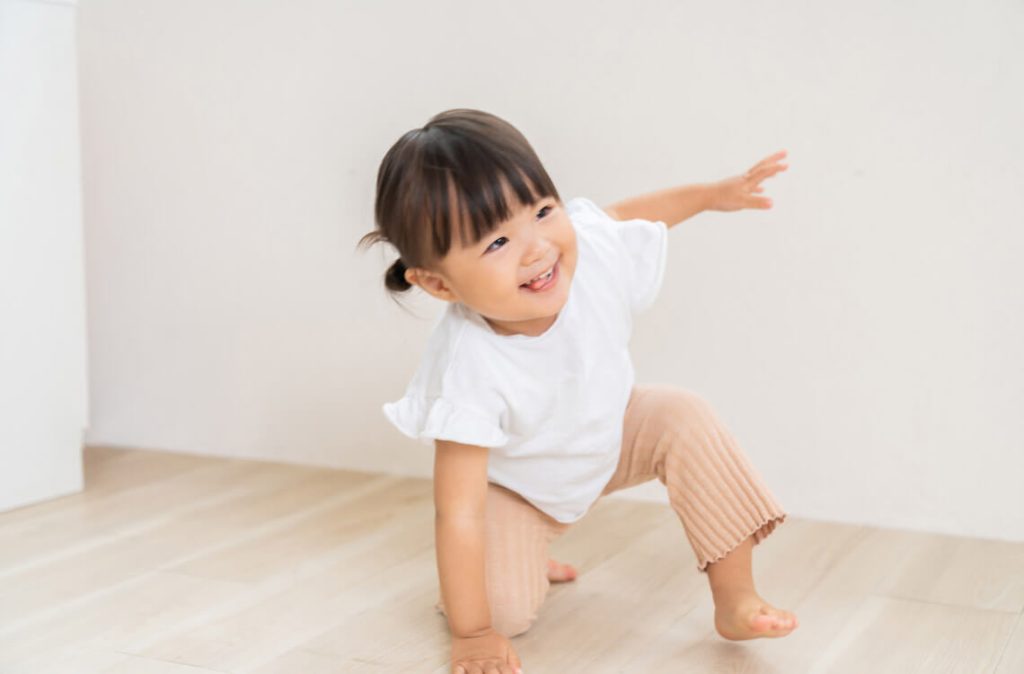Your little one has turned one and then some. As they reach their 13-month-old developmental milestones, toddlers often feel more confident on their feet.
They test boundaries, practise new words, and show stronger preferences. This month brings rapid fine-tuning of movement and blossoming social skills.
Use these milestones as friendly signposts rather than strict rules.
Here’s what you can expect from your little one’s 13-month-old developmental milestones.
Physical & Motor Milestones
Walking, Steadying and First Runs
Many 13-month-olds walk independently now. Their steps may be short and cautious. Some will begin to trot or take quick, excited steps.
Balance improves with every wobble and tumble. Encourage barefoot play at home to strengthen foot muscles and balance.
Climbing, Squatting and Carrying
Climbing becomes more purposeful as your little one grows stronger. Toddlers pull themselves onto low furniture and try to climb cushions in order to get to high places.
They are now able to squat down to pick up toys, which shows better leg control.
Your toddler is now also able to start carrying objects as they move about, which shows that they are now able to perform complex tasks like coordination and planning.
Communication & Cognitive Development
Expanding Words and Meaning
The amount of words that your child knows usually increases at this stage. Many toddlers say a handful of recognisable words.
These may include names, familiar objects, or simple commands, but they may still have trouble forming full sentences.
They also use gestures such as pointing, shaking their head, or waving. Responding to their attempts builds confidence and language.
Following Simple Instructions and Problem-Solving
A toddler’s understanding grows quickly at thirteen months. Your little one is now able to follow single-step instructions like “come here” or “give me the ball”.
They begin to solve simple problems such as pushing a chair to climb or stacking one box on another to reach a toy.
Play that invites thinking helps these skills flourish.
Social & Emotional Development
Growing Independence and Attachment
Your little one’s independence increases at this age, yet their attachment to their primary carers remains strong.
Toddlers explore their surroundings eagerly but always look back at their parents or guardians for reassurance.
Separation moments (such as you leaving for work) can still be emotional. Short, calm goodbyes and predictable routines offer security.
Interactive Play and Empathy Seeds
Play becomes more interactive. Your child may offer you toys or clap when you clap. Simple acts of imitation are early seeds of empathy.
Shared games—rolling a ball or copying actions—teach turn-taking and connection.
Sensory & Perceptual Development
Taste, Texture and Self-Feeding
Many toddlers refine self-feeding skills at 13 months. They use a spoon with growing skill and enjoy finger foods. Textures and tastes are explored eagerly.
Some strong preferences emerge, so offer variety gently and keep mealtimes relaxed.
Visual and Spatial Awareness
Depth perception and hand-eye coordination continue to sharpen. Throwing, rolling and passing toys become more precise.
They notice small details in picture books and recognise familiar places in photographs.
When to Talk to a Paediatrician
Every child hits their 13-month-old developmental milestones on their own time, but sometimes they may be lagging behind in concerning ways.
Contact your paediatrician if your toddler:
- cannot stand holding on or taking steps when supported.
- has very little babble, gestures, or recognisable words.
- shows little interest in people, eye contact, or social games.
- appears very stiff, floppy, or has poor coordination.
- isn’t exploring food textures by this age.
Early checks help identify needs and provide reassurance.
Expert Tips & Daily Activities
Encourage Confident Walking
Now that your child is getting their sea legs, allow them to practise in safe, open spaces. Hold their hands at first, then slowly reduce support as time goes on.
Push toys are helpful, but choose low, stable ones that are easy for toddlers to handle.
Boost Language Through Play
To promote your child’s language learning, you can narrate actions and name objects. Remember to pause for their response even if it’s just grunts, gestures or babbles.
Read board books daily and sing them songs that show actions. These teach your little one rhythm and support their memory.
Mealtime as Learning Time
Now that your little one can eat solid foods, you can start offering them soft finger foods and small pieces to practise pincer grip.
Let them scoop their food with a spoon. It’s okay if they spill; understanding mess is part of learning.
Play That Builds Thinking
At this age, your child’s brain is hungry for stimulation. Now is the time to introduce to them some simple puzzles. You can even teach them more challenging tasks like how to stack cups and find hidden toys.
These exercises teach a valuable lesson in problem-solving and frustration tolerance.
Stepping Into Independence
Thirteen months is a month of confidence and curiosity. Your toddler will wobble, fall, get up, and try again.
These 13-month-old developmental milestones are still a valid reason to celebrate, no matter how small.
With warmth, predictable routines and playful practice, your little one will keep growing in leaps and bounds.
Disclaimer: The information provided in this article is for informational purposes only and should not be considered as medical advice from Motherhood. For any health-related concerns, it is advisable to consult with a qualified healthcare professional or medical practitioner.
For more insightful stories and fun recipes, stay tuned to Motherhood Story!
